Recycled Polyester: Environmental Impact, Durability and Cost
Recycled polyester is an eco-friendly alternative that significantly reduces environmental impact by repurposing plastic waste, thereby conserving resources and minimizing pollution. Known for its durability, this material is ideal for various applications, offering longevity that withstands everyday use. Additionally, recycled polyester is often more cost-effective than virgin polyester, appealing to both manufacturers and consumers while promoting sustainable practices.
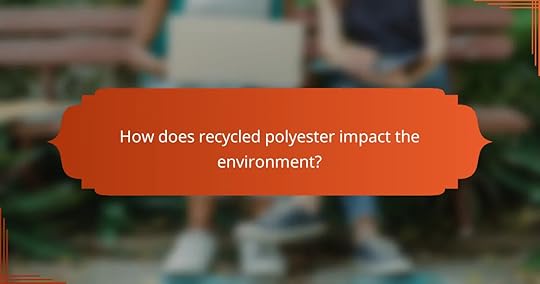
Recycled polyester significantly reduces environmental harm by minimizing waste and conserving resources. By repurposing plastic bottles and other materials, it lessens the need for virgin polyester production, which is resource-intensive and polluting.
Reduced landfill wasteUsing recycled polyester helps divert plastic waste from landfills, where it can take hundreds of years to decompose. Each ton of recycled polyester can prevent approximately 2,000 plastic bottles from ending up in waste sites, contributing to a cleaner environment.
By choosing products made from recycled polyester, consumers actively participate in waste reduction efforts. This choice not only supports recycling initiatives but also encourages manufacturers to adopt sustainable practices.
Lower carbon emissionsRecycled polyester production generates significantly lower carbon emissions compared to virgin polyester. Estimates suggest that using recycled materials can reduce greenhouse gas emissions by around 30-50% during the manufacturing process.
This reduction is crucial in combating climate change, as the textile industry is a major contributor to global carbon emissions. By opting for recycled polyester, consumers can help lessen their carbon footprint and promote a more sustainable future.
Conservation of resourcesRecycled polyester conserves natural resources by reducing the need for petroleum, the primary raw material for virgin polyester. The recycling process requires less energy and water, making it a more efficient choice overall.
Additionally, using recycled materials helps to preserve ecosystems that might otherwise be damaged by resource extraction. This conservation is vital for maintaining biodiversity and ensuring the health of our planet for future generations.
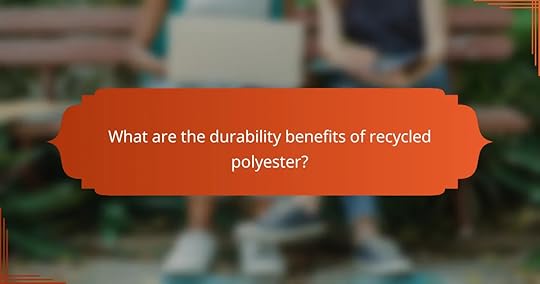
Recycled polyester offers significant durability benefits, making it a popular choice for various applications. Its robust construction enhances longevity, allowing products made from this material to withstand daily wear and tear effectively.
High tensile strengthRecycled polyester exhibits high tensile strength, which means it can endure substantial pulling and stretching without breaking. This characteristic is crucial for items like outdoor gear and activewear, where durability is essential. Products made from recycled polyester can often last longer than those made from conventional materials.
Resistance to wear and tearOne of the standout features of recycled polyester is its resistance to wear and tear. This material can withstand friction and abrasion, making it ideal for clothing and accessories that experience frequent use. For instance, recycled polyester garments maintain their appearance and functionality even after numerous washes.
Moisture-wicking propertiesRecycled polyester is known for its moisture-wicking properties, which help keep the wearer dry by drawing sweat away from the skin. This feature is particularly beneficial in athletic apparel, where comfort during physical activity is paramount. By managing moisture effectively, recycled polyester enhances the overall durability of the fabric, as it reduces the risk of mildew and odor buildup.
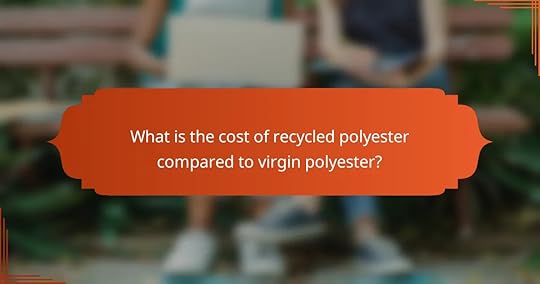
The cost of recycled polyester is generally lower than that of virgin polyester, making it an attractive option for manufacturers and consumers alike. However, prices can vary based on factors such as production scale, quality, and market demand.
Price per yard comparisonOn average, recycled polyester can cost about 10-30% less per yard than virgin polyester, depending on the supplier and specific material properties. This price difference is influenced by the availability of recycled materials and the technology used in processing them.
For example, a typical price range for recycled polyester might be around $3 to $5 per yard, while virgin polyester could range from $4 to $7 per yard. These figures can fluctuate based on market conditions and sourcing practices.
Long-term savings on replacementsChoosing recycled polyester can lead to long-term savings due to its durability and resistance to wear and tear. Products made from recycled polyester often have a longer lifespan, reducing the need for frequent replacements.
For instance, garments made from recycled polyester may last 20-30% longer than those made from virgin polyester, translating to fewer purchases over time. This durability can offset the initial cost difference, making recycled options more economical in the long run.
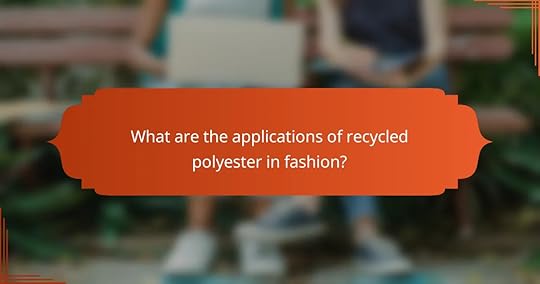
Recycled polyester is widely used in fashion for its versatility and sustainability. It is commonly found in various clothing items, from casual wear to high-performance activewear, making it a popular choice among brands aiming to reduce their environmental footprint.
Activewear productionRecycled polyester is particularly beneficial in activewear production due to its durability and moisture-wicking properties. It can withstand rigorous activities while providing comfort, making it ideal for sportswear. Many brands utilize this material to create leggings, sports bras, and jackets that perform well under stress.
When selecting activewear made from recycled polyester, look for items that feature a blend with other sustainable materials to enhance performance. Brands often highlight their use of this fabric, so check labels for recycled content percentages to ensure you’re making an eco-friendly choice.
Eco-friendly fashion brandsNumerous eco-friendly fashion brands incorporate recycled polyester into their collections, promoting sustainability without sacrificing style. These brands often focus on transparency, sharing information about their sourcing and manufacturing processes to build consumer trust.
Popular eco-conscious brands include Patagonia, Adidas, and Reformation, which offer a range of products made from recycled materials. When shopping, consider supporting these brands to contribute to a more sustainable fashion industry while enjoying high-quality apparel.
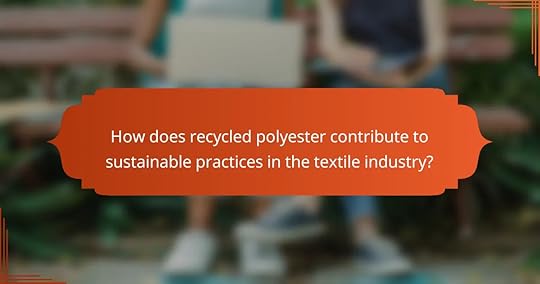
Recycled polyester plays a significant role in promoting sustainable practices within the textile industry by reducing waste and conserving resources. By repurposing plastic bottles and other materials, it minimizes the need for virgin polyester, thereby lowering energy consumption and greenhouse gas emissions during production.
Support for circular economyRecycled polyester supports the circular economy by keeping materials in use for longer periods and reducing landfill waste. This approach encourages manufacturers to design products that can be easily recycled at the end of their life cycle, fostering a system where resources are reused rather than discarded.
For example, brands that utilize recycled polyester often implement take-back programs, allowing consumers to return worn items for recycling. This not only promotes sustainability but also builds customer loyalty and enhances brand reputation.
Partnerships with recycling organizationsPartnerships with recycling organizations are crucial for the success of recycled polyester initiatives. These collaborations help ensure a steady supply of recycled materials and improve the efficiency of collection and processing systems.
Many textile companies work alongside NGOs and local governments to establish recycling programs that educate consumers on proper disposal methods. This collective effort not only increases the volume of recycled polyester available but also raises awareness about the importance of sustainable practices in the industry.
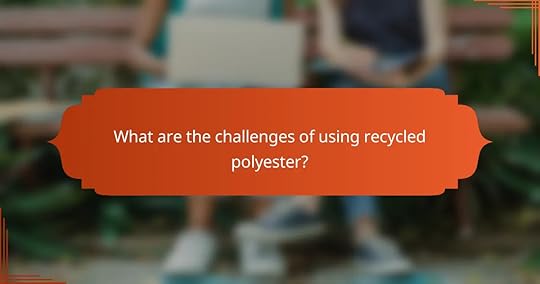
Recycled polyester presents several challenges, including quality variability and limited availability. These factors can affect the performance and cost-effectiveness of products made from this material.
Quality variabilityThe quality of recycled polyester can vary significantly based on the source materials and recycling processes used. For instance, polyester derived from post-consumer bottles may have different properties compared to that sourced from industrial waste. This inconsistency can lead to variations in durability, texture, and overall performance.
Manufacturers must carefully assess the quality of recycled polyester before use. It is advisable to work with trusted suppliers who adhere to recognized recycling standards, ensuring a more reliable product. Regular testing and quality control measures can help mitigate risks associated with quality variability.
Limited availabilityRecycled polyester is not always readily available, which can pose challenges for manufacturers seeking to incorporate it into their products. The supply chain for recycled materials can be less stable compared to virgin polyester, leading to potential shortages or delays. This limitation may affect production timelines and costs.
To address limited availability, businesses should consider building relationships with multiple suppliers and exploring local recycling initiatives. Engaging in collaborative efforts can help secure a more consistent supply of recycled polyester, ultimately supporting sustainability goals while minimizing disruptions in production.
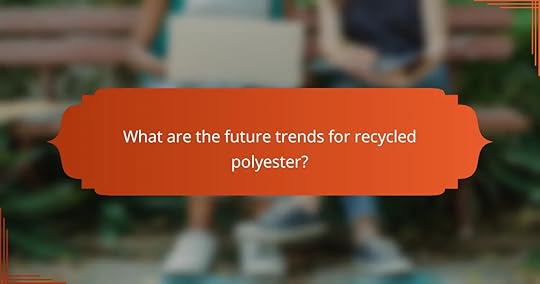
The future of recycled polyester is shaped by advancements in technology, growing consumer preferences for sustainable products, and the exploration of new markets. These trends indicate a significant shift towards more environmentally friendly practices in the textile industry.
Innovations in recycling technologyRecycling technology for polyester is rapidly evolving, with new methods that enhance the efficiency and quality of recycled materials. Techniques such as chemical recycling allow for the breakdown of polyester into its original monomers, enabling the production of high-quality fibers that can compete with virgin polyester.
Additionally, advancements in sorting and processing technologies improve the recovery rates of polyester from waste streams. This not only increases the availability of recycled polyester but also reduces the environmental footprint associated with its production.
Increased consumer demand for sustainabilityConsumers are increasingly prioritizing sustainability in their purchasing decisions, driving brands to adopt recycled polyester in their products. This shift is evident in the fashion industry, where many companies now feature recycled materials prominently in their collections.
Brands that embrace recycled polyester often highlight their commitment to environmental responsibility, which resonates with eco-conscious consumers. This trend is expected to continue, pushing more manufacturers to source sustainable materials to meet market demand.
Expansion into new marketsThe market for recycled polyester is expanding beyond traditional clothing and textiles into sectors such as automotive and home furnishings. This diversification opens new opportunities for recycled polyester applications, increasing its overall market share.
As industries recognize the benefits of using recycled materials, partnerships between textile manufacturers and other sectors are likely to grow. This collaboration can lead to innovative products that utilize recycled polyester, further promoting sustainability across various markets.



